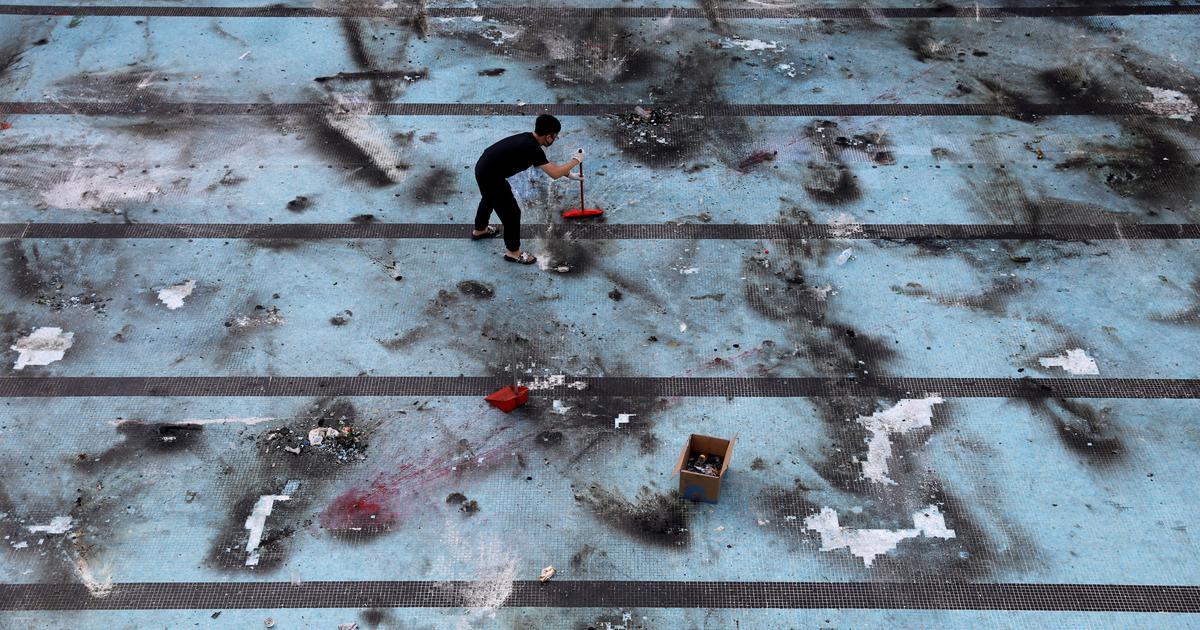Hong Kong protests: Chinese soldiers march out of barracks to clean up streets
Sun 17 Nov 2019, 11:43:38

The last time they ‘volunteered’ such services was after a typhoon in 2018. But observers have said the presence of troops at this time could enrage protestors.
Mainland Chinese soldiers on Saturday marched out of their barracks to clear the streets of Hong Kong of debris and roadblocks following a week of escalating anti-government protests.
Though the soldiers from China’s People’s Liberation Army were unarmed and in shorts and t-shirts, some observers said this act could further enrage demonstrators. But an unidentified soldier said they were only trying to help clear the streets, according to the South China Morning Post. “We volunteered! Stopping violence and ending chaos is our responsibility,” he said.
The soldiers were joined by many civilians and police officers for the hour-long clean-up, reports said.
China has garrisoned troops in Hong Kong since the 1997 handover from Britain but the soldiers have come out to the streets only one other time – to help victims after a typhoon in 2018. The garrison in Hong Kong said that some troops “helped clear the road in front of the garrison gate” when residents of the area began to clean it, according to Reuters.
According to the city’s mini-constitution, the Basic Law, as well as the Garrison Law, the Chinese Army cannot interfere in local affairs unless the local government asks for help. Following Saturday’s clean-up operations, both the garrison and the
local government said the soldiers merely volunteered and dismissed suggestions that it was against the law.
local government said the soldiers merely volunteered and dismissed suggestions that it was against the law.
A 70-year-old man died during the protests in Hong Kong on Thursday, hours after Chinese President Xi Jinping called for an end to the violence in the city. The incident came less than a week after a student protestor who had fallen from a parking garage during demonstrations died. Several schools and universities across Hong Kong cancelled classes as the protests and traffic disruptions grew over the week.
The protests
The Hong Kong protests had initially been organised to oppose an extradition bill that proposed to allow criminal suspects to be sent to mainland China for trial. However, they soon evolved into a pro-democracy backlash against the city’s government and its political masters in Beijing.
On October 23, the Hong Kong administration, led by Carrie Lam, formally withdrew the extradition bill. However, the administration accepted just one of the pro-democracy protestors’ demands. The protestors have demanded that Lam step down from her post, an inquiry into the alleged police brutality during the protests, retraction of the word “riots” to describe the demonstrations, amnesty for all those arrested for protesting, and universal suffrage.
The demonstrations have paralysed the city and affected the retail and tourism sectors, along with widespread disruptions across the financial centre and no end in sight to the violence and vandalism.
No Comments For This Post, Be first to write a Comment.
Most viewed from International
Most viewed from World
AIMIM News
Latest Urdu News
Most Viewed
May 26, 2020
Do you think Canada-India relations will improve under New PM Mark Carney?
Latest Videos View All
Like Us
Home
About Us
Advertise With Us
All Polls
Epaper Archives
Privacy Policy
Contact Us
Download Etemaad App
© 2025 Etemaad Daily News, All Rights Reserved.

.jpg)
.jpg)
.jpg)






.jpg)


.jpg)
.jpg)
.jpg)
.jpg)
.jpg)
.jpg)
.jpg)
.jpg)
.jpg)
.jpg)
.jpg)
.jpg)

















